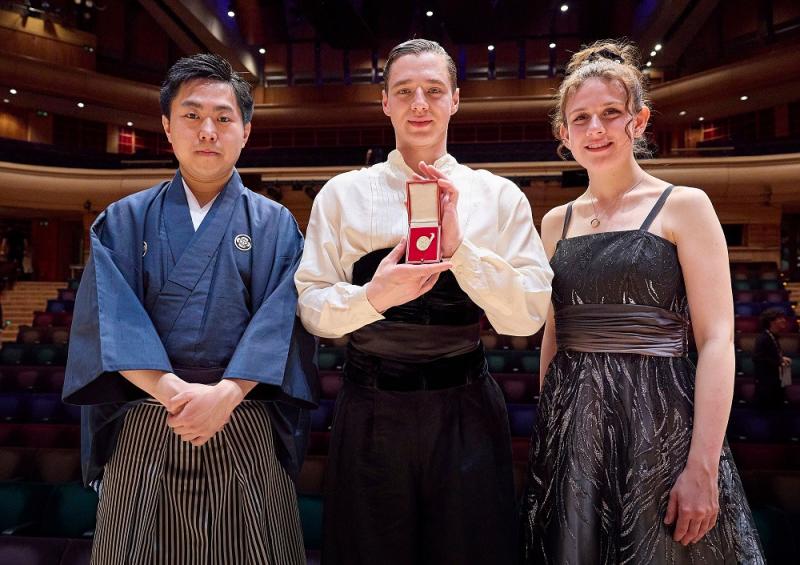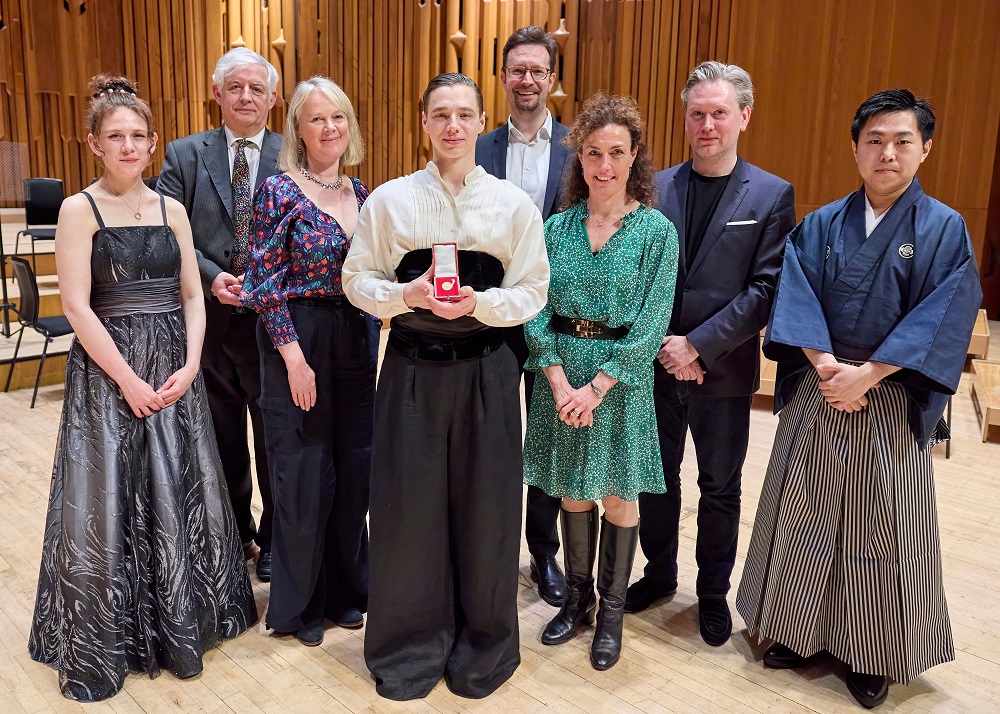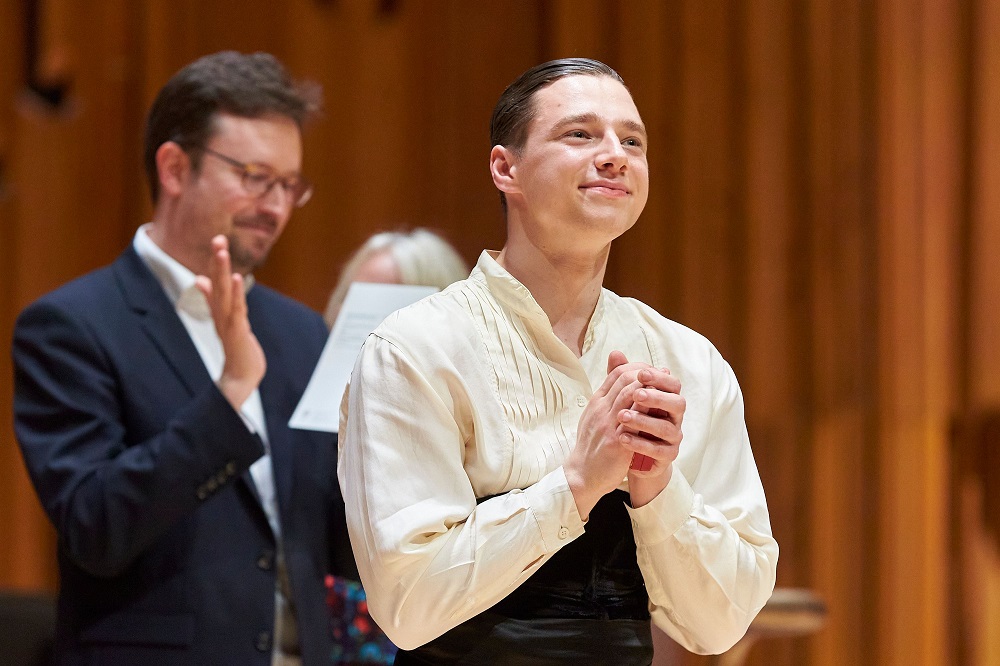Guildhall School Gold Medal 2024, Barbican review - quirky-wonderful programme ending in an award | reviews, news & interviews
Guildhall School Gold Medal 2024, Barbican review - quirky-wonderful programme ending in an award
Guildhall School Gold Medal 2024, Barbican review - quirky-wonderful programme ending in an award
Ginastera spolights the harp, Nino Rota the double bass in dazzling performances

While the Royal College of Music Symphony Orchestra were performing Messiaen’s Turangalîla-Symphonie – weirdly, despite its size and difficulty, a repertoire staple – over at the Royal Festival Hall, their Guildhall School counterparts presented a programme of stunning originality.
It was, in effect, the final of student instrumentalists’ competition for the coveted Gold Medal, alternating with singers (their turn again in 2025). The draw for collectors of the rich and rare were Argentinian top composer Ginastera’s Harp Concerto and the Divertimento concertante for double bass and orchestra by Fellini’s musical collaborator Nino Rota, with the luminous delight of Copland’s Clarinet Concerto – hardly a regular in the concert hall – in between. A 20th century feast, in short, full of contrasts and perfect balances, and no Rachmaninov or Tchaikovsky, pianist or violin, in sight.
All three young finalists (pictured below with Roger Wright, Helen Wallace, Guildhall Vice-Principal and Director of Music Armin Zammer, Emma Sweetland and conductr Jonathan Bloxham) riveted the attention from start to finish, and, maybe not so incidentally, were gorgeously attired (presentation matters). In all the cadenzas you hung on every note - not fireworks, but expression. Surely the most demandiing of the three works is the Ginastera. Harpist Heather Brooks projected the opening them in fierce octaves with total panache, knowing she could depend on the total togetherness of the Guikdhall Symphony Orchestra under formner alumnus (as cellist) Jonathan Bloxham. Disclaimer: I wouldn't normally review his concerts, having worked closely with him on four Europe Day programmes, but I made the choice here before I knew who was conducting. The finalists were essentially the thing. But by any standards the attack and sheen of the orchestral musicians was world-class throughout, with a big but lustrous string section (six double basses, even in the Copland). These concerto performances could go straight to disc and create a sensation.  Ginastera runs a gamut and makes some demands I wouldn't have thought it possible for the soloist to execute. Brooks's vigorous response to the four percussionists by hitting the soundboard in exhilarating rhythm may not be new - though it was certainly fresh and brilliant - but some of the effects in the haunting cadenza before the finale can dance its way to the end startled: as Edward Bhesania put it in his note, "pedal glissando (changing the pitch mid-note with the pedals), playing with the nails and creating a whisper-like sound by stroking (rather than plucking) the strings". And the whole, with its rapid changes between South American fiesta and eerie mysteries, hung together perfecty. A solid gold performance.
Ginastera runs a gamut and makes some demands I wouldn't have thought it possible for the soloist to execute. Brooks's vigorous response to the four percussionists by hitting the soundboard in exhilarating rhythm may not be new - though it was certainly fresh and brilliant - but some of the effects in the haunting cadenza before the finale can dance its way to the end startled: as Edward Bhesania put it in his note, "pedal glissando (changing the pitch mid-note with the pedals), playing with the nails and creating a whisper-like sound by stroking (rather than plucking) the strings". And the whole, with its rapid changes between South American fiesta and eerie mysteries, hung together perfecty. A solid gold performance.
So, too, was Kosuke Shirai's n the delicious Copland concerto, though maybe with the stress a little more on the "solid". The fullness of tone at both ends of the register almost sounded amplified, and again the cadenza was a stunner. He might not have been totally in tune with the relaxed idiom of American jazz and swing in the finale - curiously it was the cellos who played outside the box in one extraordinary rendering here - but excellent teamwork with his fellow players and conductor sealed his success.
Serbian double bass player Strahinja Mitrović commanded the final party, Rota's delectable parade of four contrasting movements. It's unashamedly popular, but as in his film scores Rota makes the melodies his own, never ersatz, even when he unashamedly imitates first Prokofiev and then Shostakovich in the Alla marcia. Tchaikovsky was the melancholy model in part for the Aria, the double-bass's chance to sing at length; it came as no surprise to read later that Rota had intended this for "a slow march of Russian exiles heading towards Siberia" before he withdrew from work on the film of Doctor Zhivago.  Mostly, though, it was high jinks, and Mitrović's charismatic moving with the orchestra, his resonance at top and bottom of the range - the middle is always tricky for the double-bass to project compared to the cello - and his almost total mastery of intonation won him the prize (Mitrović pictured above with Zanner behind him). Personally, I'd have given a joint award - that happened, for instance, in 1933, when Max Jaffa shared the honours with one Katherine L J Mapple - but there could be no unhappiness with the choice made by guest judges Emma Sweetland, Helen Wallace (now Head of Music at the Barbican) and Roger Wright. Everyone looked genuinely deighted at the end, as well they might be. A friend of mine playing for student auditions last week said the standard had gone through the roof, and you can well believe it. Let's just hope there's still work out there when they graduate.
Mostly, though, it was high jinks, and Mitrović's charismatic moving with the orchestra, his resonance at top and bottom of the range - the middle is always tricky for the double-bass to project compared to the cello - and his almost total mastery of intonation won him the prize (Mitrović pictured above with Zanner behind him). Personally, I'd have given a joint award - that happened, for instance, in 1933, when Max Jaffa shared the honours with one Katherine L J Mapple - but there could be no unhappiness with the choice made by guest judges Emma Sweetland, Helen Wallace (now Head of Music at the Barbican) and Roger Wright. Everyone looked genuinely deighted at the end, as well they might be. A friend of mine playing for student auditions last week said the standard had gone through the roof, and you can well believe it. Let's just hope there's still work out there when they graduate.
rating
Explore topics
Share this article
The future of Arts Journalism
You can stop theartsdesk.com closing!
We urgently need financing to survive. Our fundraising drive has thus far raised £49,000 but we need to reach £100,000 or we will be forced to close. Please contribute here: https://gofund.me/c3f6033d
And if you can forward this information to anyone who might assist, we’d be grateful.

Subscribe to theartsdesk.com
Thank you for continuing to read our work on theartsdesk.com. For unlimited access to every article in its entirety, including our archive of more than 15,000 pieces, we're asking for £5 per month or £40 per year. We feel it's a very good deal, and hope you do too.
To take a subscription now simply click here.
And if you're looking for that extra gift for a friend or family member, why not treat them to a theartsdesk.com gift subscription?
more Classical music
 BBC Proms: The Marriage of Figaro, Glyndebourne Festival review - merriment and menace
Strong Proms transfer for a robust and affecting show
BBC Proms: The Marriage of Figaro, Glyndebourne Festival review - merriment and menace
Strong Proms transfer for a robust and affecting show
 BBC Proms: Faust, Gewandhausorchester Leipzig, Nelsons review - grace, then grandeur
A great fiddler lightens a dense orchestral palette
BBC Proms: Faust, Gewandhausorchester Leipzig, Nelsons review - grace, then grandeur
A great fiddler lightens a dense orchestral palette
 BBC Proms: Jansen, Royal Concertgebouw Orchestra, Mäkelä review - confirming a phenomenon
Second Prom of a great orchestra and chief conductor in waiting never puts a foot wrong
BBC Proms: Jansen, Royal Concertgebouw Orchestra, Mäkelä review - confirming a phenomenon
Second Prom of a great orchestra and chief conductor in waiting never puts a foot wrong
 BBC Proms: Royal Concertgebouw Orchestra, Mäkelä review - defiantly introverted Mahler 5 gives food for thought
Chief Conductor in Waiting has supple, nuanced chemistry with a great orchestra
BBC Proms: Royal Concertgebouw Orchestra, Mäkelä review - defiantly introverted Mahler 5 gives food for thought
Chief Conductor in Waiting has supple, nuanced chemistry with a great orchestra
 Dunedin Consort, Butt / D’Angelo, Muñoz, Edinburgh International Festival 2025 review - tedious Handel, directionless song recital
Ho-hum 'comic' cantata, and a song recital needing more than a beautiful voice
Dunedin Consort, Butt / D’Angelo, Muñoz, Edinburgh International Festival 2025 review - tedious Handel, directionless song recital
Ho-hum 'comic' cantata, and a song recital needing more than a beautiful voice
 Classical CDs: Dungeons, microtones and psychic distress
This year's big anniversary celebrated with a pair of boxes, plus clarinets, pianos and sacred music
Classical CDs: Dungeons, microtones and psychic distress
This year's big anniversary celebrated with a pair of boxes, plus clarinets, pianos and sacred music
 BBC Proms: Liu, Philharmonia, Rouvali review - fine-tuned Tchaikovsky epic
Sounds perfectly finessed in a colourful cornucopia
BBC Proms: Liu, Philharmonia, Rouvali review - fine-tuned Tchaikovsky epic
Sounds perfectly finessed in a colourful cornucopia
 BBC Proms: Suor Angelica, LSO, Pappano review - earthly passion, heavenly grief
A Sister to remember blesses Puccini's convent tragedy
BBC Proms: Suor Angelica, LSO, Pappano review - earthly passion, heavenly grief
A Sister to remember blesses Puccini's convent tragedy
 BBC Proms: A Mass of Life, BBCSO, Elder review - a subtle guide to Delius's Nietzschean masterpiece
Mark Elder held back from blasting the audience with a wall of sound
BBC Proms: A Mass of Life, BBCSO, Elder review - a subtle guide to Delius's Nietzschean masterpiece
Mark Elder held back from blasting the audience with a wall of sound
 BBC Proms: Le Concert Spirituel, Niquet review - super-sized polyphonic rarities
Monumental works don't quite make for monumental sounds in the Royal Albert Hall
BBC Proms: Le Concert Spirituel, Niquet review - super-sized polyphonic rarities
Monumental works don't quite make for monumental sounds in the Royal Albert Hall
 Frang, Romaniw, Liverman, LSO, Pappano, Edinburgh International Festival 2025 review - sunlight, salt spray, Sea Symphony
Full force of the midday sea in the Usher Hall, thanks to the best captain at the helm
Frang, Romaniw, Liverman, LSO, Pappano, Edinburgh International Festival 2025 review - sunlight, salt spray, Sea Symphony
Full force of the midday sea in the Usher Hall, thanks to the best captain at the helm
 Elschenbroich, Grynyuk / Fibonacci Quartet, Edinburgh International Festival 2025 review - mahogany Brahms and explosive Janáček
String partnerships demonstrate brilliant listening as well as first rate playing
Elschenbroich, Grynyuk / Fibonacci Quartet, Edinburgh International Festival 2025 review - mahogany Brahms and explosive Janáček
String partnerships demonstrate brilliant listening as well as first rate playing

Add comment